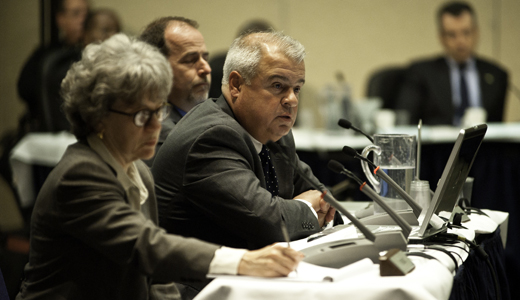The Associated Students Office of the President and External Vice President of Statewide Affairs (EVPSA) is providing transportation and housing for 24 selected students to voice their opinions on a proposed tuition increase at the meeting of the UC Board of Regents at UCSF Mission Bay this Wednesday.
Students will leave Tuesday evening and return the following evening on Wednesday. This is the first large scale attempt at taking students to a UC Regents Meeting since the last tuition increase in 2009. On Wednesday, the Board will consider the proposal to increase UC tuition for all students by five percent annually for five years, which stands to increase tuition by several thousand dollars per year by its proposed end during the 2019-2020 academic year.
Since its announcement by the UC Office of the President last week, the proposal has drawn sharp criticism from both students across the system and the state officials working closely with California Governor Jerry Brown.
According to EVPSA and third-year political science and film and media studies major Melvin Singh, taking students to the meeting would effectively increase student representation.
“I think everyone comes from different walks of life and there different issues to be had,” Singh said. “Some people can’t afford to go to school. Some people find that tuition increases tend to diminish the classroom experience. I want people to come in and talk about those issues, because those don’t necessarily get to be expressed during Regents Meetings.”
Singh also said he wants UCSB to have a larger presence at Regents meetings so that board members can better recognize the needs of individual campuses.
“Usually when they do presentations about the UC System, they seem to lump all the UC schools together,” Singh said. “They look at the data from the UC System as a whole but don’t look at what was happening at a campus by campus basis. I want there to be a distinct UCSB voice there so they understand that it is not one individual system.”
According to Singh, the amount of time given for public comment, typically 20 minutes, poses as a constraint to students who want to have their voice heard during the meeting. Singh said he anticipates that the Regents will extend the usual time given for the public forum due to the amount of students that will be present at the meeting.
“With how many students that will be there, especially with Berkeley nearby who I‘m sure will be bringing a lot, there will be a considerable amount of debate,” said Singh. “Hopefully all 24 of our students to voice their opinions in that time frame.”
Fourth-year psychology major Steve Lim said he supports A.S.’s work to bring students to the meeting.
“I think it’s a good idea,” Lim said. “It means we can actually get our opinions heard, especially since it’s kind of important to some people like me who is broke and struggling because of tuition costs, not to mention the costs of just getting by.”
First-year pre-biopsychology major Justin Bueno said he understands the need for the tuition increase because the state is bankrupt, but does not support the Regent’s current budget plan. According to Bueno, student representatives should be at the meeting because students are the ones most affected by the tuition increase.
“Even though I believe they won’t be able to do much, I believe it’s important to show the Regents who they’re affecting,” said Bueno. “They’ll probably see them and disregard them like they have been doing the past 10 years with tuition increases.”
Singh said the message he wants to send to the Regents this Wednesday is that although the UC is a world class university, it has many problems. According to Singh, students have trouble getting classes, classes are too big and there is not enough support for sexual assault and mental health programs.
Singh also said public universities should remain public and not take on qualities of private universities.
“Just because you make your university seem more exclusive by turning away more students, what’s going on inside is not upholding the image that they’re trying to build,” Singh said. “We’re being more privatized by having the illusion of a public university without the quality of a private university.”















